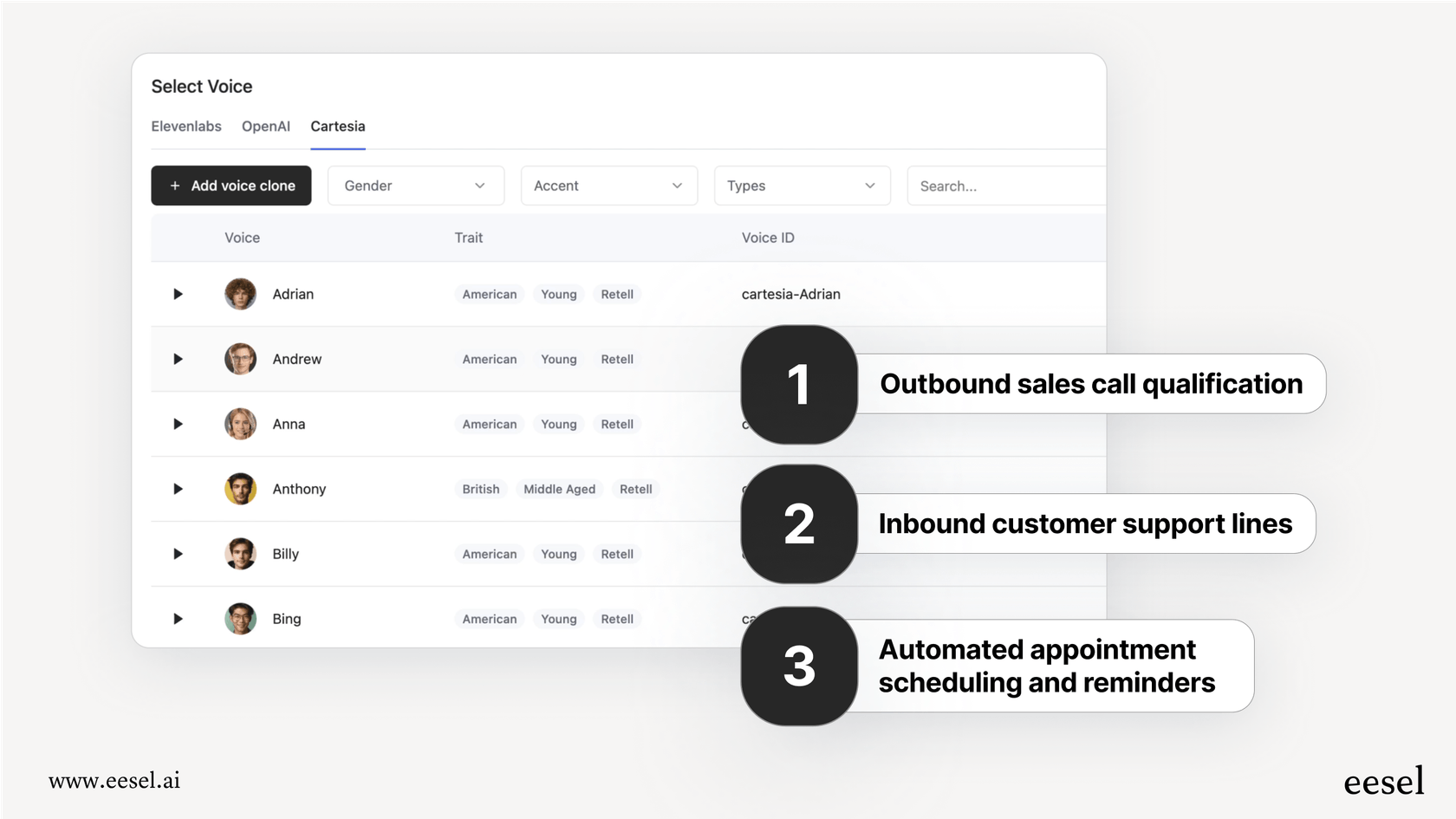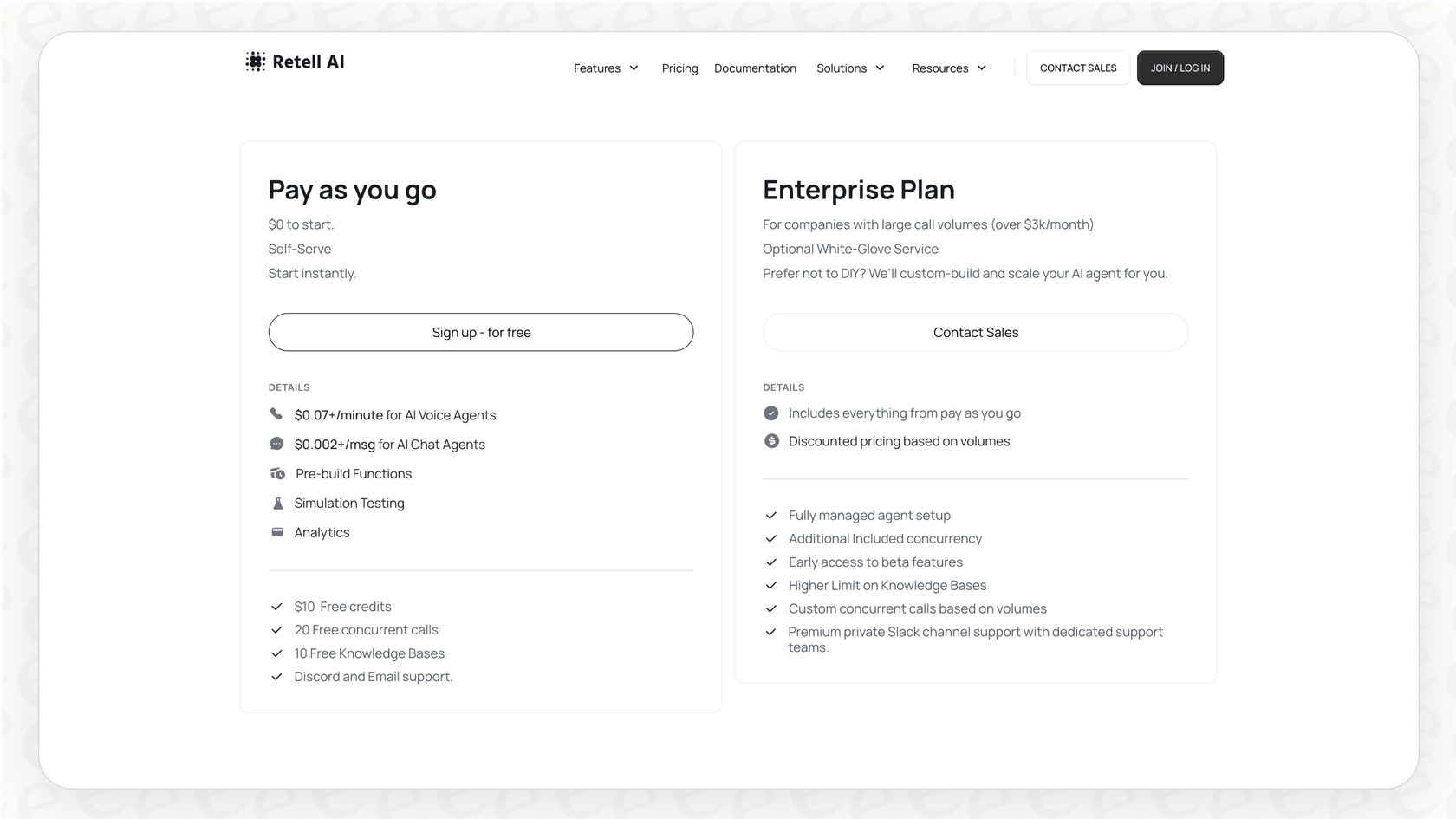
AI voice agents are everywhere these days. Businesses are looking for ways to automate customer calls, and these tools promise to handle everything from scheduling appointments to answering questions, 24/7. In this conversation, Retell AI often comes up, especially for companies with strong engineering teams who want to build a voice solution from scratch.
But before you jump in, you have to talk about the cost. This guide is here to give you a clear, no-nonsense breakdown of the Retell AI pricing model. We'll get into its per-minute fees, the extra costs that can pop up, and help you figure out what you'd actually end up paying.
And while voice AI is impressive, we'll also touch on why starting with text-based support (like email and chat) might be a smarter first move for getting a faster, more predictable return.
What is Retell AI?
So, what is Retell AI? Think of it as a powerful set of building blocks for developers to create AI that can talk on the phone. It’s not really for your average support manager or business owner; it's built for engineering teams who need total control over every little detail of a call.
People typically use it for things like:
-
Outbound sales calls to qualify leads
-
Inbound phone lines for customer service
-
Automated appointment scheduling and reminders
The platform is known for its techy features, like low-latency streaming that makes conversations feel less robotic and interruption handling so the AI doesn't just talk over your customers. It also lets you plug in different Large Language Models (LLMs) or phone carriers. This makes it a super flexible tool, but you absolutely need some serious technical skills to make it work.

A detailed breakdown of the Retell AI pricing model
Retell AI uses a pay-as-you-go model. On the surface, that sounds great and flexible, but it can make budgeting a real challenge. Your final bill isn't one simple number; it’s a mix of several different costs that can change from month to month.
The core components of your per-minute cost
Every single minute of every call is priced based on three separate services working together: the voice, the AI "brain," and the phone connection itself.
| Component | Pricing (per minute) | Key Details |
|---|---|---|
| Conversation Voice Engine | $0.07 - $0.08 | This is the price for the text-to-speech tech. It changes depending on which voice you pick, like one from ElevenLabs or OpenAI. |
| Large Language Model (LLM) | $0.003 - $0.50+ | This is the AI doing the actual thinking. The cost here can swing wildly depending on the LLM you choose. A simpler one like GPT-4o mini is cheap, but a high-end, real-time model can get expensive fast. |
| Telephony | ~$0.015 | This is the fee for using Retell's phone service (which runs on platforms like Twilio). You can bring your own carrier to avoid this fee, but you'll just be paying your own provider instead. |
Other costs that can sneak up on you
On top of those core per-minute fees, a few other charges can find their way onto your bill, making the final cost even harder to pin down.
-
Knowledge Base Usage: If you need your AI to pull answers from your documents, that's an extra "$0.005/minute". You get your first 10 knowledge bases for free, but after that, it's "$8/month" for each one.
-
Batch & Branded Calls: Running big outbound call campaigns has its own costs. You'll pay "$0.005" for every number you dial in a batch and another "$0.10" for every call you make with a branded caller ID.
-
Phone Number Rentals: A basic phone number is "$2/month". But if you want a verified number to look more legit and avoid spam filters, that can jump to "$100/month".
-
Concurrency: You can run 20 calls at the same time for free. If your call volume is higher than that, each extra line for a simultaneous call costs "$8/month".
The enterprise plan for bigger teams
For companies spending more than $3,000 a month, Retell has an Enterprise Plan. It offers volume discounts that can drop the per-minute rate to as low as $0.05, plus you get dedicated support. But this is a "Contact Sales" deal, meaning the price isn't public. You’ll have to negotiate, which adds another layer of complexity to the whole process.

Key features and limitations
It's only fair to talk about what Retell AI does well, but it's just as important to understand where it might not be the right fit, especially if you're not a developer.
Where Retell AI gets it right: Control and flexibility
For a technical team, Retell AI is a dream playground. It provides a solid API and WebSocket support, giving developers precise control over conversations as they happen. The option to bring your own LLM or phone carrier is a big win for companies that have very specific technical needs.
Features like warm transfers (passing a call smoothly to a human) and branded caller ID are genuinely useful for building out advanced sales or support systems. If you have the engineers, you can pretty much build any voice experience you can think of.
The challenges for business users
The platform’s greatest strengths are also its biggest weaknesses for non-technical teams.
-
You need a developer for everything. Retell AI isn't something a support manager can just log into and start using. Every little tweak, from changing a prompt to testing a new call flow, has to be done by a developer. This creates a huge bottleneck and makes it slow and expensive to make changes.
-
There’s no visual builder. You won't find a drag-and-drop interface or a friendly dashboard for managing your agents. There’s also no built-in way to simulate conversations, which means testing is a manual, code-heavy task. You can't easily see how your agent will sound or act without getting your engineering team involved.
-
The costs are unpredictable. This is probably the biggest hurdle for most businesses. With so many moving parts in the pricing, it's almost impossible to know what your bill will be at the end of the month. A sudden spike in call volume or a decision to use a more powerful LLM could make your costs shoot up without warning. That’s a tough situation for any department trying to stick to a budget.
A simpler alternative: Predictable pricing for text-based support
While voice AI gets a lot of hype, the truth is that most businesses can get a bigger, faster win by automating their text-based support first. Just think about all the repetitive questions your team answers every day via email, web chat, and Slack.
This is where a tool like eesel AI offers a different approach. It’s built to be simple, user-friendly, and have predictable pricing. Instead of a confusing mess of per-minute fees, eesel AI offers clear plans based on the number of AI interactions. You always know exactly what you’ll pay, so there are no nasty surprises.
Here’s a quick comparison of the two approaches:
| Feature | Retell AI | eesel AI |
|---|---|---|
| Pricing Model | Modular, pay-as-you-go (per minute) | All-inclusive, tiered (per interaction) |
| Cost Predictability | Low (Varies with usage and features) | High (Fixed monthly/annual cost) |
| Target User | Developers / Engineers | Support Managers / Business Users |
| Setup Process | Requires coding and API configuration | Radically self-serve, go live in minutes |
| Core Use Case | Voice Agent Automation | Text-Based Support Automation (Help Desk, Chat) |
| Simulation | Requires manual testing infrastructure | Built-in simulation on historical tickets |

What really makes eesel AI different is that it’s radically self-serve. A support manager can sign up, connect their help desk like Zendesk or Freshdesk in a single click, and have an AI agent up and running in minutes. No coding required.
Plus, eesel AI has a powerful simulation mode. You can test your AI on thousands of your own past support tickets to see exactly how it will perform before you ever let it talk to a real customer. This ability to test and get a clear picture of your resolution rate is something you just don't get with developer-first platforms like Retell.
The Retell AI pricing model is complex and really only makes sense for a specific type of user: a developer-led team with a flexible budget building a custom voice AI project. It’s powerful, but that power comes at the cost of simplicity and predictability.
For most businesses just looking for a fast, reliable, and easy way to lighten their support load, a complicated voice platform probably isn't the answer. Focusing on the text-based channels where your customers already are, with a tool like eesel AI, is often the smarter, more efficient choice that delivers a clear return without all the headaches.
Ready to see how simple AI support automation can actually be? Start your free eesel AI trial today.
Frequently asked questions
Retell AI pricing operates on a pay-as-you-go model, meaning your costs are based on your usage each month. It's a modular system where various services contribute to the overall per-minute cost of a call.
The core Retell AI pricing per minute is composed of three main parts: the Conversation Voice Engine for text-to-speech, the Large Language Model (LLM) for the AI's "brain," and Telephony fees for the phone connection. Each component has its own rate that factors into the total.
Yes, beyond the core per-minute charges, additional fees can include Knowledge Base usage, costs for Batch & Branded Calls, Phone Number Rentals, and Concurrency fees if you exceed the free simultaneous call limit. These can add up and affect your final bill.
Retell AI does offer an Enterprise Plan for companies spending more than $3,000 a month. This plan typically provides volume discounts and dedicated support, but the exact Retell AI pricing terms are negotiated directly with their sales team.
Predicting monthly Retell AI pricing is challenging because it's based on variable factors like call volume, the specific LLM chosen, and the utilization of various add-on features. Any change in usage or feature selection can significantly alter the final cost, making budgeting difficult.
Retell AI pricing is highly variable and depends on per-minute usage and multiple add-ons, making it less predictable. In contrast, text-based solutions like eesel AI typically offer simpler, tiered pricing based on interactions, providing a clear and predictable monthly cost without hidden surprises.
Share this post

Article by
Kenneth Pangan
Writer and marketer for over ten years, Kenneth Pangan splits his time between history, politics, and art with plenty of interruptions from his dogs demanding attention.







